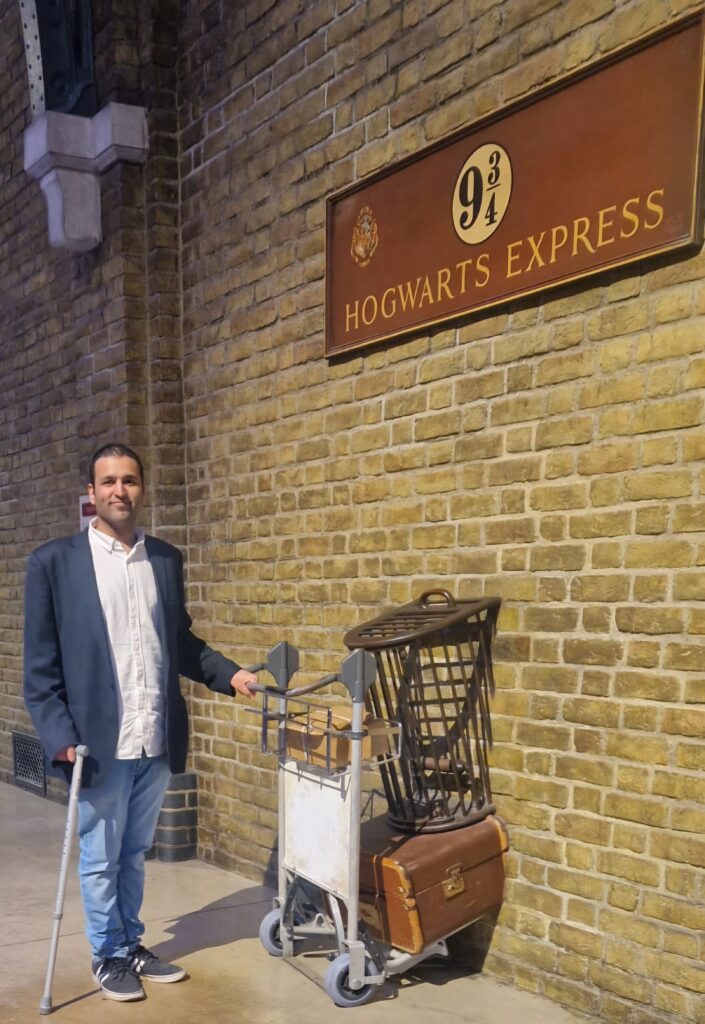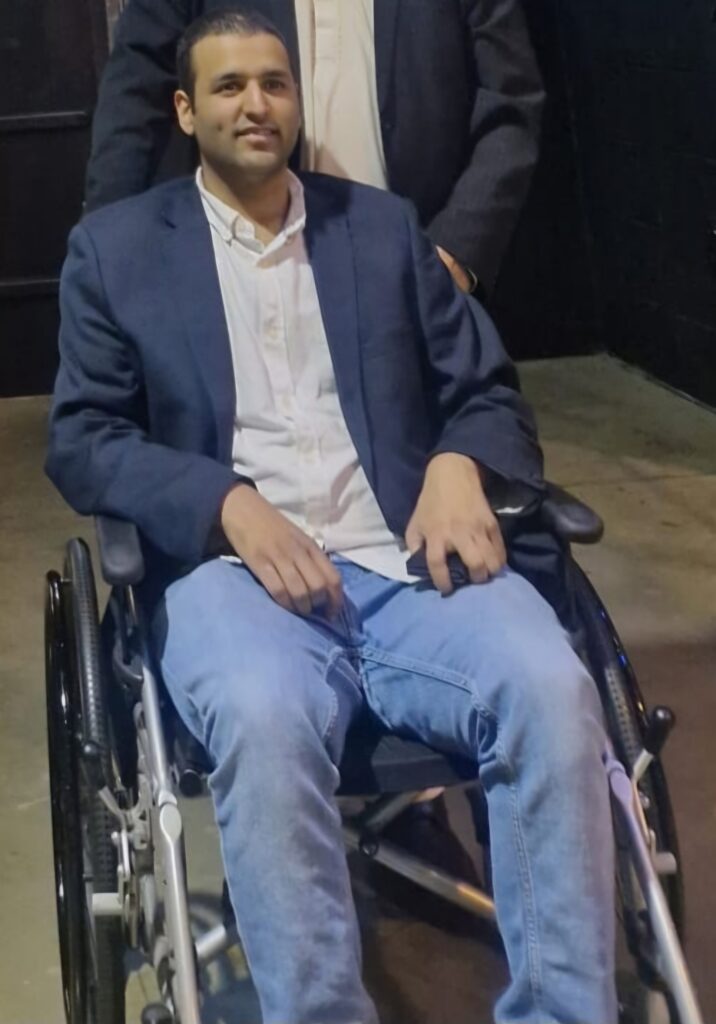Drunk or disabled? – challenges with ataxia
Written by Haider Farouq
Journey to diagnosis
The problems started aged 11, when I was referred to the doctor with balance, speech and eating problems. I was passed from doctor to doctor, often dismissed as clumsy or I’ll ‘grow out of it’. The rare nature of ataxia makes many people including medical professionals disregard the symptoms, however, it didn’t make things any easier as I spent the next decade or so struggling, while desperately seeking answers. Cycling is a distant memory now, but I recall a few years ago before my diagnosis, when I could still cycle. It was a sunny day and I cycled to and around my local park, when on the final return lap home, I suddenly veered onto my right-side, narrowly avoiding a passing pedestrian. “You shouldn’t cycle when you’re drunk mate” he yelled—to this I had two thoughts, I don’t drink and whatever was happening inside me was hardly my fault. My new neurologist in Glasgow, Scotland sent me for genetic testing, and it was then, just under three years ago, the test came back positive for a mutation in the SYNE-1 gene. I got the much sought-after diagnosis – autosomal recessive cerebellar ataxia type 1 (ARCA-1).
Ataxia is an umbrella term for a group of degenerative neurological disorders that affect a variety of things in the body including: balance and co-ordination (which causes problems with movement); speech (which sounds unclear and slurred) and eating (problems with swallowing foods). It may also cause deterioration of the hearing, body, vision (nystagmus) and heart (1, 2). The symptoms mean ataxia patients are often accused of being drunk, and connecting the dots now to that cycling incident, I fully understand why, though it isn’t a justification.
Grief and acceptance
Ataxia is a rare condition, and I’m not sure even my neurologist expected my specific diagnosis. It compelled me to do my own research, and understand what my diagnosis entails for me, as the doctors I saw previously weren’t even aware of it! I also hadn’t come across anyone with my exact ataxia before, which scared me even more. I had been having problems for over a decade before my diagnosis, so co-ordinated care was in place and I was receiving allied healthcare (from neurology, speech therapy and physiotherapy). The management plan hasn’t changed significantly from when I first starting receiving co-ordinated care (5 years before diagnosis), but at this stage, it’s all about management, and the limited research on my type of ataxia has shown it is slow progressing (3, 4), which gives me hope for the future.
My diagnosis bought serious mental health problems, and even though I was expecting my diagnosis for years prior, actually getting diagnosed is a completely different battle. I had constant fears of: rejection, societal expectations, the future, and relations with friends/family. I felt lazy, unmotivated and turned to food for comfort. I put on a lot of weight, but looking back now I realise the importance of finding a coping mechanism when you’re at your lowest. The weight can be lost later, and the most important thing is you’re still around, as you don’t want to risk paying the price with your life.
Increased weight has a direct negative impact on my condition, my balance and co-ordination were getting worse, and I was more prone to falls. It was a vicious cycle that had to be broken somehow, and I knew it couldn’t go on – I mustered up the courage to bring this up at the end of a doctor’s appointment.
My doctor knew I was struggling mentally, but I turned down anti-depressants and opted instead for a referral to mental health services. However, it was the results from a blood test taken after that appointment that provided the wakeup call required. My cholesterol was borderline high, and though I was shocked, I wasn’t surprised given the amount of junk I had consumed over the last few months. I was a gym rat prior to my condition progressing, so I had knowledge of fat loss/muscle gain, as well as the positive effects of exercise/fitness on mental health. I cancelled my referral to mental health services and put myself on a calorie-controlled diet to bring my cholesterol levels down to normal. I’ve since maintained both good eating habits without calorie counting and maintained my weight at the required level. Hearing compliments from friends/family has also bought back the feel-good factor.

I accepted the diagnosis news gradually and within the first few months found an ataxia support group, I also found an ARCA support group on social media with 31 members globally. I have several symptoms, continually see new ones, and I’ve accepted the decline is inevitable. My mobility has deteriorated the fastest, and since I moved back home to Bradford, England from Glasgow, Scotland, I’ve found and asked for a referral to Sheffield Ataxia Centre, one of two specialist ataxia centres in the UK. This is in hope of seeing specialist doctors who may be able to do something more which my current doctors can’t.
A new normal
Every day with chronic illness is unpredictable, I’ve made plans far in advance, and had to change those plans at the last minute due to feeling tired. This is where I have to put myself first and not prioritise what others say. I have limited energy or ‘spoons’ on a daily basis, and need to go about my day in a measured fashion. Because when those ‘spoons’ are finished, I’m done for the day and need to rest. I also realised my fear of rejection, but once I accepted people come and go in your life, I started seeing things from a different angle. Some are more accepting of chronic illness, while others will brush it off as ‘nothing’, and that’s fine because the most important people are there no matter what, and beyond everything, I am my biggest advocate.


One thing I definitely underestimated was the mental impact of my condition. I sought comfort from food when I got diagnosed, and then inadvertently therapy from my friends (the staff) at PureGym Glasgow Shawlands, and then professional counselling from the University of Strathclyde in the final year of my PhD.
This reiterates the importance of mental health and seeking help, bad mental health is a silent killer if left untreated and it is important, especially when living with a rare disease, to always have some sort of support provision in place.
There is no cure for ataxia and the challenges I deal with are hard. I have my limitations and wouldn’t wish what I have to deal with on anyone. But I am grateful for being able to study, to work, to drive a car and to live alone independently, I aim to do these things and more, for as long as I can.
On International Ataxia Awareness Day (25th September 2024), I advocate for myself, my condition, and for earlier access to coordinated care for those with undiagnosed illnesses. I’ve been called ‘inspiring’, ‘smiley’ and ‘positive’, and while I appreciate the compliments, I’m of the view if you don’t laugh, you’ll cry. After all, I have ataxia, but it doesn’t have me!
1. https://www.ataxia.org/what-is-ataxia/
2. https://www.hopkinsmedicine.org/health/conditions-and-diseases/friedreich-ataxia
3. Qian N et al. Case Report: Late-Onset Autosomal Recessive Cerebellar Ataxia Associated With SYNE1 Mutation in a Chinese Family. Frontiers in Genetics. 2022;13.
4. Traschütz A et al. Autosomal Recessive Cerebellar Ataxias in Europe: Frequency, Onset, and Severity in 677 Patients. Movement Disorders. 2023;38(6):1109-12.














